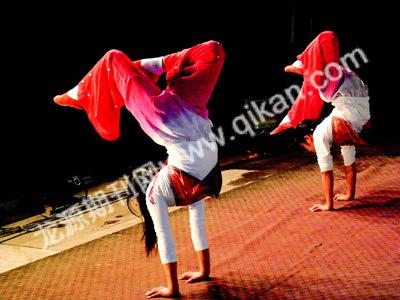Private Opera Troupes Flourish in Zhejiang
Bao Zhicheng

Folk opera troupes in Zhejiang have been a phenomenon that goes back to ancient times. Operas shows in rural areas across Zhejiang are always regional and seamlessly associated with local way of life: weddings, birthdays, temple fairs, longevity celebrations, festivals, new houses, religious celebrations, anniversaries, good luck rituals, business startups, housewarming parties. These occasions all call for opera performances.
Rural Showbiz Market: Demands and Supplies
Private opera troupes mushroomed in the 1980s across rural Zhejiang. They did quite well like their counterparts in other private business fields. In the 1990s, private opera troupes flourished on the strength of the flourishing private sector in the provinces economy. The decade saw about 400 troupes in full actions. At present, 485 private opera troupes employ about 15,000 artists, stage 194,000 shows a year and earn 388 million yuan. The private showbiz accounts for 85% of the rural market. In some parts of Zhejiang, private opera troupes account for more than 95% of the rural showbiz.
Shengzhou, where Yueju opera originated about 100 years ago, is home to more than 100 Yueju Opera troupes. Every village has a stage and everyone can sing some arias. The nationwide reform started in 1978 and ushered in an unprecedented prosperity for private Yueju opera troupes in Shengzhou. Today, the troupes in Shengzhou employ about 3,600 artists and bring in the total business revenue of 50 million yuan a year. About forty troupes can stage 450 shows a year. For some villages, showbiz is a big business and showbiz income account for one third of rural income of a village. In some parts of Shengzhou, private showbiz is a pillar of local economy.
Wenzhou in southern Zhejiang has a tradition of operas. Unlike Shengzhou, the city and its rural areas do not have a single-minded preference for any specific opera. The 56 private opera troupes stage shows in Peking Opera, Yueju Opera and Ouju Opera. These troupes enjoy brisk business, for the private sector is the major wholesale buyer of rural entertainment. Rural shows are usually bought and paid by business bosses.

Most of these artists in these private troupes are from rural areas. They are artists after putting on their showbiz costumes. They are farmers after taking off their costumes. They know what rural audiences want to see. A private troupe usually has a repertoire of 50 plays and can stage shows in one village for ten to fifteen consecutive days without repetition. Some troupes have a repertoire of more than 100 plays. They go anywhere so long as they are appropriately paid. Rural audiences like these troupes because they can afford to and love to hire them to put on shows which they love. Some fans just follow these troupes around and watch shows for a month. Jinyun, a county in Lishui District in southern Zhejiang, has more than 30 Wuju Opera troupes. They stage shows not only in Zhejiang but also in neighboring Jiangxi and Anhui provinces.

Government Support
In the early 1990s, Taizhou District encouraged private opera troupes by hosting a show festival for folk opera troupes. The 10th Zhejiang Operas Festival in Shengzhou doubled as a competition for private opera troupes. It was the first time that private opera troupes joined government-sponsored professional competition. Twelve opera troupes in six opera genres took part. The China Yueju Opera Festival held in Shaoxing in October 2006 brought private opera troupes to compete head-on against government-sponsored opera troupes. Three private troupes grabbed top prizes at the festival.
In order to get more plays onto the market, over 30 senior playwrights hired by the provincial playwrights association have sorted out more than 60 scripts previously used by professional troupes that no longer exist. The copyrights of these scripts together with musical scores are now on the market to private troupes at favorable prices. The playwrights have also created new plays and performances. On the other hand, some private opera troupes have their own playwrights who produce new things for rural audiences. In order to attract younger audiences, some troupes perform acrobatics, cross-talks, song and dance, and Chinese rap at interval.
Challenges and Prospects
Private opera troupes have felt pressures for survival in the new century as the cultural life in rural areas has diversified and the problems plaguing these troupes have long since begun to asserting themselves again. And they badly need new plays.
The government will give more support to private opera troupes by releasing favorable policies and strengthening market administration. Troupes themselves will have to be more creative and adaptive. In the autumn of 2008, leaders of the CPC Zhejiang committee and the provincial government issued important instructions about the private opera troupes and departments concerned are looking at a series of supportive policies to be released. Private opera troupes believe that they will soon see another boom. □

